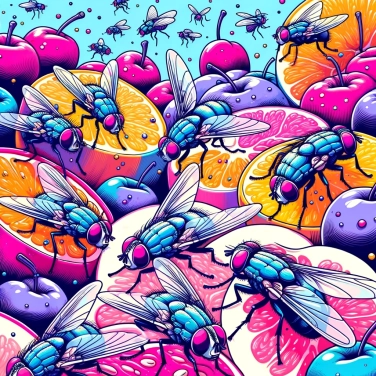Flies buzz around ripe fruits because they are attracted by the sweet smell of the fruits emitting pheromones, chemical compounds that entice them to feed on their rotten flesh.

Flies particularly love ripe fruits because of their sweet smell, which is very attractive to them. As they ripen, fruits produce a series of volatile chemical compounds (alcohols, acids, esters) that are easily detectable by flies. The riper the fruit becomes (even slightly fermented), the more these compounds are produced: a true invitation to come and feast! Additionally, the soft and moist texture of ripe fruit provides an ideal surface for feeding and laying eggs. In short, for a fly, a ripe fruit looks like an irresistible delicious buffet.
Flies primarily locate themselves thanks to their incredible sense of smell. Their antennas easily detect the characteristic sweet smell of ripe fruits, released by certain volatile molecules resulting from sugar fermentation, particularly ethanol and acetic acid. The hundreds of tiny sensory hairs on their antennas function like miniature radars that can guide them precisely toward these appetizing odors, even from a distance. In addition to this highly developed sense of smell, their vision also helps a bit: they are sensitive to bright colors, especially the shades of yellow, orange, or red typical of ripe fruits. To put it simply, flies effectively track specific chemical and visual signals: as soon as they pick up on these sensory cues, it's time for a feast!
Sweet ripe fruits like bananas, apples, peaches, pears, figs, or melons particularly attract flies. The riper and softer the fruit, the higher its fermented sugar content increases, producing fragrant compounds that are highly appreciated by these little curious creatures. Flies love the pronounced scents released by the fruit as it becomes a bit overripe, even fermented. Citrus fruits like oranges and tangerines can also become very attractive as they age, especially when they start to spoil, releasing their juices and tangy odors. The same goes for those with delicate skins like strawberries, cherries, or plums, which, by deteriorating quickly, rapidly attract these noisy visitors.
Flies primarily play the role of natural decomposer. When they land on ripe fruits, they contribute to their degradation by laying eggs, from which larvae will quickly emerge. These larvae greatly accelerate decomposition by consuming the flesh of the fruit. This phenomenon is actually beneficial: it helps recycle nutrients by returning organic matter to the soil. As unpleasant as they may be in a kitchen, flies actively participate in the natural cycle by allowing other organisms, such as bacteria and fungi, to completely finish the job. Moreover, by flying from one fruit to another, flies sometimes facilitate the dispersion of spores and microorganisms. Therefore, they contribute discreetly but effectively to the overall balance of ecosystems.
To avoid flies, keep your ripe fruits in the cool, especially during warm periods: the cold prevents them from ripening too quickly and limits the emission of odors that attract insects. Also think about covering the fruits with a cloth or a fruit dome, as this prevents direct access for flies and reduces emanations. Regularly clean your kitchen to avoid food scraps, as they easily attract these pests. And don’t forget your trash cans: keep them covered, use well-sealed bags, and take them out often to prevent the accumulation of decomposition odors, which flies particularly enjoy. Some aromatic plants like basil, mint, or lavender can also deter these intruders when placed near your fruits.
Flies have olfactory receptors that are so sensitive they can detect the smell of a ripe fruit from a distance of several meters. That's why they arrive so quickly as soon as a fruit begins to ripen!
Some varieties of flies, such as the fruit fly (or vinegar fly), use ripe and fermented fruits to lay their eggs, thereby providing their larvae with an immediate source of abundant and nutritious food.
Ripe bananas release a special gas called ethylene, which also speeds up the ripening of nearby fruits and strongly attracts insects like flies.
Placing a halved lemon studded with cloves near your fruits can naturally repel flies due to the strong repellent scent released by this combination.
Indeed, the increased presence of flies can signal an environment conducive to other harmful insects, such as ants or fruit flies. Such a concentration should prompt you to better check the quality and storage conditions of your food items and to adopt preventive measures.
Sure! Here’s the translation: Yes, flies can carry bacteria and pathogens by moving from one surface to another. Their presence around fruits can increase the risk of food contamination. Therefore, it is essential to wash or discard fruits that have been heavily exposed.
To avoid attracting flies, it is recommended to store ripe fruits in the refrigerator or under covered containers such as food domes. Regularly maintaining hygiene and promptly disposing of damaged fruits also significantly contributes to reducing the presence of flies.
Damaged or overripe fruits release more fermented chemical compounds such as ethanol and organic acids. These substances are particularly attractive to flies, which seek out these nutrient sources for feeding and reproduction.
Yes, there are several effective natural tricks. For example, placing natural repellents such as basil, mint, or cloves nearby often helps to repel flies. Some traps made with apple cider vinegar mixed with dish soap can also effectively reduce the fly population.

No one has answered this quiz yet, be the first!' :-)
Question 1/5